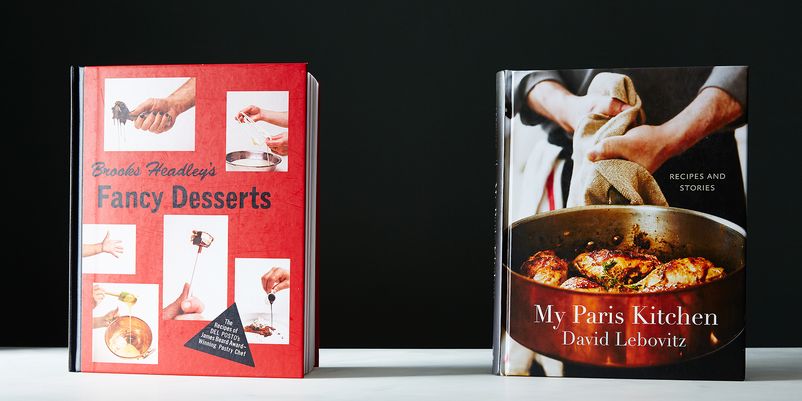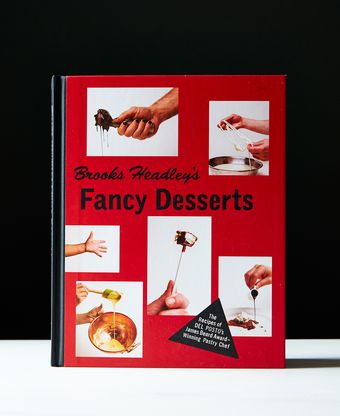David Lebovitz is a cook and a baker and a veteran of Alice Waters’s Chez Panisse, who discovered his writerly voice ten years ago when he began blogging culinary dispatches from Paris on his website. You hear that voice in My Paris Kitchen. It is personal, accessible, chatty, and the book is as much an autobiography as a collection of recipes. It is also, on just about every page, a happy hymn to the City of Light. There are some inspired shorter versions of bistro classics (like slow roasting duck legs in the oven rather than laboriously cooking them in gallons of fat), and some clever insider tricks (substituting cocoa powder for blood in coq au vin, adding an egg or two to a crêpe batter to keep it from running away from you, and bourbon, beer, and ketchup in the sour-sweet French version of pork ribs).
It also does to me what any good cookbook does to most of us who like reading good cookbooks: They make us want to make food.
In this, reading a good cookbook is different from other reading experiences. Not only does it transport you to another place (for instance, to a condition of wanting to eat food now, please), it transports you into your kitchen.
The salt cod fritters with tartar sauce, for instance. I love salt cod (brandade de morue); why have I never fried them as fritters? Lebovitz's are killer, especially garnished with a proper tartar (mayonnaise, with equal parts chopped up cornichons, shallots, and capers). I made my mayonnaise, mainly because I will never stop being thrilled at watching what happens to egg yolks and oil when whisked together in a state of panic and fear. With the leftover mayonnaise, I made a celeriac salad. In France, I had discovered that that is what everyone does with their leftover mayonnaise: They mix it with grated celeriac. Lebovitz adds mustard, which makes the dish sing.
I read his preparation of guinea hen and figs -- the bird cooked in a Dutch oven with wine and stock and root vegetables (with a little flour to make a roux, an old-fashioned and surprisingly happy touch). And I thought: This is what I want to eat right now. Lebovitz’s recipe assumes one guinea hen for four people, which struck me as perfectly sound, as long as everyone is skinny and doesn’t like food and you have five other courses to go with it, plus three desserts. But since I am lucky enough to have a large casserole pot I cooked two birds; and since I was making this in the winter, when there were no figs, I used apples instead, roasting them separately and introducing apple variations (cider, Calvados, cinnamon) to my pot.
This is the kind of thing a good cookbook does. It makes you make stuff. You feel creative. And you’re not. (Even the apple variations in my pot came from another book.) And yet you are: After all, when you finish a novel -- say, something by Jonathan Franzen -- you don’t get out of your chair and make a family, do you? No. But with a good cookbook you get out of your chair and make food.
The book is anyone’s winner, unless, like me, you happen to read Fancy Desserts afterwards.
Wow! Where did this guy come from? And can I make sure that I follow him wherever he goes next?
Since 2008, Brooks Headley has been the pastry chef of Del Posto. Until recently, I was living in France since 2008. (Thus my insider track on what to do with leftover mayonnaise.) My not being in America is not necessarily a reason for my not knowing anything about Brooks Headley (James Beard winner, much celebrated, etc.), but it is a possible one. The fact is: I did know nothing, and had heard nothing, and therefore came to this book as a completely ignorant, uninformed, clueless reader.
And the book is wonderful.
Is it a cookbook? Yes; mainly; sometimes. The photography sucks, deliberately. The color is washed out, deliberately. It’s the opposite of food porn. It’s what you go to if you just wasted an afternoon watching the Food Network.
But is it a cookbook? There is no chapter of pastry kitchen basics -- which is curious in a dessert book -- except that here, there is no basic anything.
The recipes come at you every which way. They are sometimes complete. Some of them probably work. They are all nothing less than very idiosyncratic. And yet they are also, somehow, not arty.
Maybe it’s not a cookbook.
From it, you might learn how to pickle strawberries (always useful). Or to search out ugly fruit (a relief). Or how to candy fennel, or to smoke your applesauce (who knew?), or to make a gelato from celery or cashews or yeast (!), and to use only with frozen peas (not fresh).
It will deepen your love for vinegar.
But did I, could I, would I, would you, would anyone actually cook from it?
Well, a little. I tried the Coca-Cola sauce, which doesn’t actually use Coca-Cola, but simulates it and cites no less an authority than the great Ferran Adrià of El Bulli fame to celebrate the American love of sweet and savory: A burger with ketchup and a Coca-Cola is our national treasure. "Coke is it, man. Coke is it."
I didn’t try to make the brown butter panna cotta and not merely because it would have taken three days. (Okay, maybe that was the reason, but I love the idea of it, and will try to make it, I’m sure of it, probably.) And I also liked the riffing on gelatin. Headley once hated gelatin: "Why do so many pastry chefs use so much gelatin? They rely on the stuff. They worship it! Is it all about control? I prefer being slightly out of control." (He then rediscovers gelatin, and thus the panna cotta. I love gelatin.)
I am, as I write, making the book’s version of the red pepper sauce inspired by the demon Dario Cecchini, the Satanic butcher in Tuscany.
But is this a cookbook?
I am cooking from it. So, maybe?
It has a lot of jokes. It has anecdotes about working with Mark Ladner, one of the genius chefs in New York -- and you can never get enough Mark Ladner. It has essays by the Headley’s friends (on sugar, or taste buds, or chocolate).
It is humble. It is brave. It is extreme. It is wacky. It is by far and away the best anti-cookbook cookbook I have ever read. I will be reading it again and again. It is genius. Bravo, Brooks Headley!


129 Comments
Remember Piglet 2013 when April Bloomfield's book was to be judged by Fergus Henderson? To avoid controversy decision was made by a voice cast of other judges and Henderson only wrote what makes a good cookbook. Why not this time?
http://www.tipsybaker.com/
http://www.tipsybaker.com